Readings Newsletter
Become a Readings Member to make your shopping experience even easier.
Sign in or sign up for free!
You’re not far away from qualifying for FREE standard shipping within Australia
You’ve qualified for FREE standard shipping within Australia
The cart is loading…






An original reading of three Platonic dialogues concerned with the soul, tyranny, self-knowledge, and the beautiful.
Guided by the question "What is Socratic self-knowledge," this study begins with Plato's Charmides because it is within this work, more than any other, that the utility of self-knowledge becomes the predominant theme. In this dialogue, Socrates explores the possibility of the very culmination of his philosophical investigations-knowledge of ignorance. This happens through an investigation of the perplexing concept, sophrosune. Alan Pichanick's approach offers a new perspective upon the perplexing exploration of sophrosune in the Charmides by placing much greater emphasis on the neglected "erotic setting" in the dramatic introduction and argues that our reading of the rest of the dialogue should be done in light of this dramatic setting. The erotic setting of the Charmides combined with the discussion of philosophical wonder in the Symposium and tyrannical eros in the Republic gives guidance about how to think about the potential connection between Socratic self-knowledge and knowledge of the good and also shows why the characters of Charmides and Critias fail to come to such knowledge. Here we have the Platonic diagnosis of the tyrant, whose soul never wonders at anything beyond itself.
$9.00 standard shipping within Australia
FREE standard shipping within Australia for orders over $100.00
Express & International shipping calculated at checkout
Stock availability can be subject to change without notice. We recommend calling the shop or contacting our online team to check availability of low stock items. Please see our Shopping Online page for more details.
An original reading of three Platonic dialogues concerned with the soul, tyranny, self-knowledge, and the beautiful.
Guided by the question "What is Socratic self-knowledge," this study begins with Plato's Charmides because it is within this work, more than any other, that the utility of self-knowledge becomes the predominant theme. In this dialogue, Socrates explores the possibility of the very culmination of his philosophical investigations-knowledge of ignorance. This happens through an investigation of the perplexing concept, sophrosune. Alan Pichanick's approach offers a new perspective upon the perplexing exploration of sophrosune in the Charmides by placing much greater emphasis on the neglected "erotic setting" in the dramatic introduction and argues that our reading of the rest of the dialogue should be done in light of this dramatic setting. The erotic setting of the Charmides combined with the discussion of philosophical wonder in the Symposium and tyrannical eros in the Republic gives guidance about how to think about the potential connection between Socratic self-knowledge and knowledge of the good and also shows why the characters of Charmides and Critias fail to come to such knowledge. Here we have the Platonic diagnosis of the tyrant, whose soul never wonders at anything beyond itself.